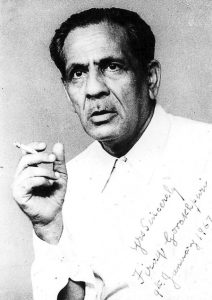 Firaq Gorakhpuri
Firaq Gorakhpuri
(Firāq Gorakhpūrī)
1896-1982
 Firaq Gorakhpuri
Firaq GorakhpuriFiraq Gorakhpuri (Firāq Gorakhpūrī; 1896-1982) was born in Gorakhpur, in what is today Uttar Pradesh as Raghupati Sahae (Raghūpatī Sahāʼe) into a kayāsth family (scribes). A brilliant student, he became a member of the prestigious and exclusive Indian Civil Service, but resigned in support of Gandhi’s non-cooperation movement. He then joined Allahabad University as a lecturer in English. He took the pen name ‘Firaq’ (“separation,” “grief”) and strongly backed the Progressive Movement from its inception. He spoke at the important first meeting of the All-India Progressive Writers’ Association in April 1936. He discussed the way Indian religious and cultural movements such as the Brahmo Samaj (Society of God) and Arya Samaj (Society of Aryans), the Wahabi and Aligarh Movements contributed to the development of India’s modern literature. While he wrote naz̤ms with strong Progressive political content—such as his famous “Ādhī rāt ko” (At Midnight)* and “Ās̲ār-i inqilāb” (Science of Revolution)*—he established himself as a major poet of the Progressive Movement by infusing the traditional Urdu ghazal—such as “Yih narm havā” (Such very soft air)* and “Zamīn badlī, falāk badlā” (Earth changed, heaven changed)*—with new, Progressive content.
He wrote over a dozen volumes of poetry; for his major work, Gul-i naghmah (Song Rose; 1960), he was awarded the 1960 Urdu Sahitya Akademi Award. He also received the prestigious Jnanpith Award in 1969, the first Urdu writer so honored. For his acceptance speech for this award, see “Some Reflections,” Contemporary Indian Literature, 1 (1971) 8-9. Also see C.J.S. Jossan, “Firaq Gorakhpuri: A Poet of Synthesis,” Books Abroad 43:4 (Autumn 1969) 534-41. Mehr Afshan Farooqi gives a refreshing, critical reading of Firaq’s poetry and an account of his assumed sexual relationship with critic and short-story writer Muhammad Hasan Askari (1919-78) and how it possibly affected Askari’s criticism of Firaq’s poetry, in Urdu Literary Culture: Vernacular Modernity in the Writing of Muhammad Hasan Askari (2012) 47-74.
English translations of his poetry are Firaq Gorakhpuri, Selected Poetry, tr. K. C Kanda (2000) and The Selected Poetry of Firaq Gorakhpuri, tr. Noorul Hasan (2008). See Ajai Mansingh, Firaq Gorakhpuri: The Poet of Pain & Ecstasy (2015). The author is the poet’s nephew.
2. Ās̲ār-i inqilāb / Science of Revolution
3. G̲h̲azal: Āj bhī qāfilah-i ʻishq ravān̲ hai kih jo thā / Ghazal: Today, too, the caravan of love
4. G̲h̲azal: Chalak ke kam nah ho aisī koʼī sharāb nahin̲/ Ghazal: There is no wine
6. G̲h̲azal: Yih narm havā jhilmilā rahe hain̲ cirāg̲h̲ / Ghazal: Such very soft air
7. G̲h̲azal: Yih nikhaton̲ kī narm ravī yih havā yih rāt / Ghazal: This soft movement of fragrances
8. G̲h̲azal: Zamīn badlī, falak badlā / Ghazal: Earth changed, heaven changed
INTERVIEWS
.
Shauq, Sumat Prakash. Thus Spoke Firaq . . . A Collection of Interviews (1959-1976). New Delhi: Allied Publishers. 1992.
.
Suggested Reading:
Gorakhpuri, Firaq. The Selected Poetry of Firaq Gorakhpuri. New Delhi: Sahitya Akademi. 2008.
Mansingh, Ajai. Firaq Gorakphuri: The Poet of Pain & Ecstasy. New Delhi: Lotus Collection, Roli Books. 2015.
Vanita, Ruth and Saleem Kidwai. Same-Sex Love in India: Readings from Literature. New York:St. Martin’s Press. 2000.

